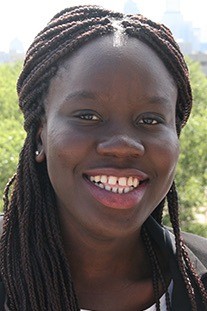What is your educational background?
I completed high school in Ivory Coast with a concentration in science. I originally wanted to go into medicine and fell in love with research along the way. I graduated from Temple University with a Bachelor of Science in Biology and completed a post-baccalaureate fellowship with the National Institute of Health (NIH) at Indiana University Purdue University in Indianapolis in Neuroimmunology. Then, I started my PhD in Immunology at the University of Chicago.
What is your current occupation?
I am a fourth year PhD candidate in Immunology. My thesis project focuses on understanding mechanisms by which viral infections in the gut can trigger autoimmune diseases like celiac disease.
One of my aims is to decipher how the immune system reacts to foreign molecules like food during an ongoing viral infection. Answering this question will give us a better understanding on how the immune system functions to keep us safe and devise strategies to apply this knowledge in the development of vaccine therapies.
What or who got you into STEM?
The environment mostly! Both of my parents have science degrees and I had good grades in my science classes in middle and high school. In undergrad, I really loved being in the lab more than being in class.
I loved the “freedom” that biomedical research gave me. Being in lab allowed me to see that science is real and can be used to solve relevant problems in medicine.
What is the biggest challenge/barrier you have faced as an African in STEM?
I think one of the biggest challenges I experienced was preparation. I didn’t get exposed to STEM resources early enough in my educational journey. For example, I gave my first presentation on a science topic when I was a junior in college. I really did know much about careers in biomedical science until college in the U.S.
The second thing I would say is advocating for myself. I grew up in a very traditional family with an emphasis on respecting authority figures where talking back is frown upon. When I started my PhD, this process was challenging for me because I didn’t push back comments or criticism of my work, I didn’t know how to speak up for myself.
How do you think your background/upbringing has been beneficial in your journey/career?
I think my upbringing taught me to be resilient and continue to move forward in the face of adversity. I moved to the U.S. at 18 and had to learn English and adjust from a French educational system to an American one. I think these experiences forced me to mature pretty quickly and learn how to push through.
How do you think we can start to change the narrative surrounding African contributions
to global STEM research & careers?
Representation is the key. There are brilliant African scientists out there doing incredible work at home and abroad but we never hear of them. I think initiatives aiming at highlighting the work and contributions of Africans are going to help change the narrative.
In addition, having more equitable collaborations and partnerships will contribute to change the narrative of Africans. We often see “African studies” aiming at understanding infectious diseases or cancer for example on the continent, but the contribution of Africans is often limited at the data collection and rarely at the level of study design, ownership and data analysis.
I believe the terms of collaborative work need to change and put an emphasis on equal contribution for all the parties involved and dignify the contribution of Africans.
What advice would you like to give to young, aspiring Africans in STEM?
Very basic but really do not give up and embrace your uniqueness. I want aspiring Africans in STEM to realize that their voice matter and their perspectives is important and needed in STEM.
Do you have any projects you’re working on that you would like us to highlight?
I started a science Facebook page called “a little bit of science” with a couple of friends and I break down big scientific concepts in virology and immunology with an emphasis on COVID19 now. https://www.facebook.com/101Immunology/






